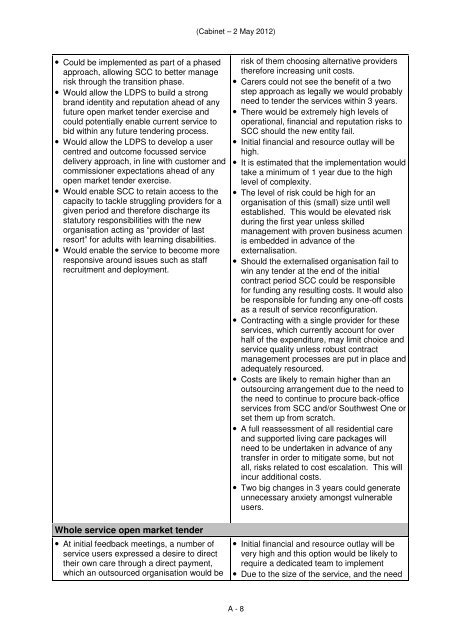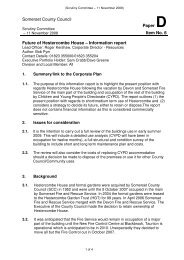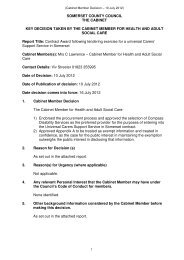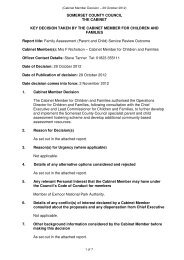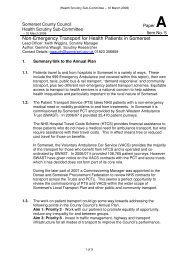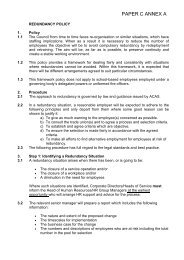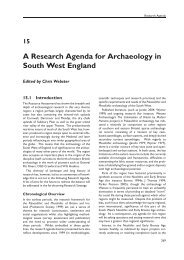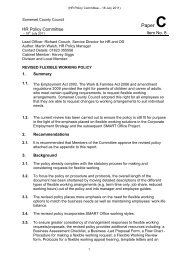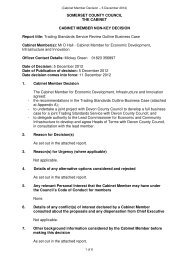Service Reviews â Outline Business Case - Somerset County Council
Service Reviews â Outline Business Case - Somerset County Council
Service Reviews â Outline Business Case - Somerset County Council
Create successful ePaper yourself
Turn your PDF publications into a flip-book with our unique Google optimized e-Paper software.
(Cabinet – 2 May 2012)<br />
• Could be implemented as part of a phased<br />
approach, allowing SCC to better manage<br />
risk through the transition phase.<br />
• Would allow the LDPS to build a strong<br />
brand identity and reputation ahead of any<br />
future open market tender exercise and<br />
could potentially enable current service to<br />
bid within any future tendering process.<br />
• Would allow the LDPS to develop a user<br />
centred and outcome focussed service<br />
delivery approach, in line with customer and<br />
commissioner expectations ahead of any<br />
open market tender exercise.<br />
• Would enable SCC to retain access to the<br />
capacity to tackle struggling providers for a<br />
given period and therefore discharge its<br />
statutory responsibilities with the new<br />
organisation acting as “provider of last<br />
resort” for adults with learning disabilities.<br />
• Would enable the service to become more<br />
responsive around issues such as staff<br />
recruitment and deployment.<br />
Whole service open market tender<br />
• At initial feedback meetings, a number of<br />
service users expressed a desire to direct<br />
their own care through a direct payment,<br />
which an outsourced organisation would be<br />
risk of them choosing alternative providers<br />
therefore increasing unit costs.<br />
• Carers could not see the benefit of a two<br />
step approach as legally we would probably<br />
need to tender the services within 3 years.<br />
• There would be extremely high levels of<br />
operational, financial and reputation risks to<br />
SCC should the new entity fail.<br />
• Initial financial and resource outlay will be<br />
high.<br />
• It is estimated that the implementation would<br />
take a minimum of 1 year due to the high<br />
level of complexity.<br />
• The level of risk could be high for an<br />
organisation of this (small) size until well<br />
established. This would be elevated risk<br />
during the first year unless skilled<br />
management with proven business acumen<br />
is embedded in advance of the<br />
externalisation.<br />
• Should the externalised organisation fail to<br />
win any tender at the end of the initial<br />
contract period SCC could be responsible<br />
for funding any resulting costs. It would also<br />
be responsible for funding any one-off costs<br />
as a result of service reconfiguration.<br />
• Contracting with a single provider for these<br />
services, which currently account for over<br />
half of the expenditure, may limit choice and<br />
service quality unless robust contract<br />
management processes are put in place and<br />
adequately resourced.<br />
• Costs are likely to remain higher than an<br />
outsourcing arrangement due to the need to<br />
the need to continue to procure back-office<br />
services from SCC and/or Southwest One or<br />
set them up from scratch.<br />
• A full reassessment of all residential care<br />
and supported living care packages will<br />
need to be undertaken in advance of any<br />
transfer in order to mitigate some, but not<br />
all, risks related to cost escalation. This will<br />
incur additional costs.<br />
• Two big changes in 3 years could generate<br />
unnecessary anxiety amongst vulnerable<br />
users.<br />
• Initial financial and resource outlay will be<br />
very high and this option would be likely to<br />
require a dedicated team to implement<br />
• Due to the size of the service, and the need<br />
A - 8


